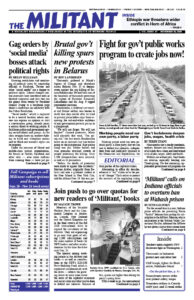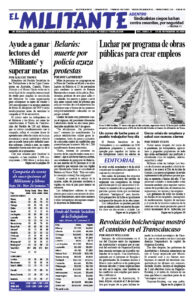Growing restrictions and monitoring of political views by censorship officials at Facebook, Twitter and other “social media” are a danger to political rights. Liberal thought-control overseers have interfered with or blocked comments and sites that run the gamut from tweets by President Donald Trump to a Facebook page about a conference on solidarity with the Cuban Revolution.
“Social media,” which is supposed to be a neutral location where anyone can express an opinion or start a conversation group, already poses a serious threat to working people. It facilitates police and government spying on individuals and groups. As the class struggle heats up, workers fighting to build and strengthen unions and for Black and women’s rights can be targeted.
Under the pressure of liberal and middle-class radical organizations, the bosses at Twitter, Facebook and other sites — who make millions from running them — have put political censors and “fact checkers” to work deciding what’s politically correct and what should be flagged or shut down.
What Facebook administrators did to the “Stop the Steal” Facebook group is a good example of how the right to freedom of speech is being attacked. The “Stop the Steal” Facebook page was created at 3 p.m. Nov. 4 by 30-year-old Kylie Jane Kremer, who runs an organization called Women for America First. The presidential election had taken place the day before in a very tight race between Trump and Joe Biden with inconclusive results in several states.
The group uploaded a video showing a crowd outside a polling station in Detroit, charging that “Biden is stealing the vote.” Within 22 hours, the group had amassed over 320,000 users, making it “one of the fastest-growing groups in Facebook’s history,” according to the New York Times.
Facebook then promptly deleted the group from its system, just 23 hours after it had begun. This group was organized around “delegitimization of the election process,” charged Facebook spokesman Tom Reynolds, attempting to explain its disappearance.
“They were flagging our posts,” Kremer told the Times. “This is what they do, they censor.”
These self-appointed online political censors have joined in the four-years-long effort to oust the Trump administration, something they hope the election has accomplished. Biden himself said he favored Facebook censoring Trump’s “threatening behavior and lies.”
Both Facebook and Twitter officials have begun “fact checking” and placing disclaimers on comments they don’t agree with. They did so for Trump’s tweets where he called mail-in ballots “fraudulent.”
Twitter banned all political advertising leading up to the election. In August, Facebook bosses announced the removal of 14,200 online groups, claiming they were “militarized social movements.”
Yoel Roth, who has been designated as “head of site integrity” at Twitter, said in a blog that his goal is “to limit the spread of potentially harmful and misleading content.” But he doesn’t say a word about his own political record of railing against Trump’s presidency.
Twitter officials went so far as to shut down the New York Post ’s account Oct. 14 for a story the paper ran on business dealings in Ukraine by Hunter Biden, Joe Biden’s son. Also closed were the accounts of White House spokesperson Kayleigh McEnany, the “Team Trump” campaign account, and that of Politico journalist Jake Sherman. This attack on freedom of the press was reversed two weeks later when, under pressure, Twitter restored the Post’s account.
The point here is not whether Trump, his supporters, or anyone else is right or wrong. The Constitution gives everyone the right to express their opinion, and this is important for the working class. Instead, liberal “do-gooders” like those on social media have anointed themselves to determine what is “politically correct.”
But, as the experiences of the Socialist Workers Party and other proletarian fighters has proven, whenever censorship like this starts up, it inevitably ends up being aimed at the working class. It is the working class that needs free expression to discuss and debate a fighting way forward.
Just like pro-Trump forces, Cheryl LaBash, who writes for Struggle for Socialism and is a national co-chair of the National Network on Cuba, had her personal Facebook page deactivated Oct. 28. Unlike “Stop the Steal” groups, LaBash had joined in calls for liberals and radicals to “Occupy the streets” if it looks like Trump is trying to steal the election. “This is no idle threat,” Struggle for Socialism wrote, “Trump has his own paramilitary police, Homeland Security, the support of the most virulent and reactionary police departments, and a myriad of violent, racist, vigilante-type groups.”
LaBash said other groups that had joined with her to call for a protest on Nov. 4 in Baltimore along these lines had been shut down as well.
Censoring Cuba solidarity event
Facebook political censorship has also been extended to include supporters of the Cuban Revolution. On Oct. 29 Facebook deleted the National Network on Cuba’s events page for a Nov. 14-15 online solidarity with Cuba conference. The page reported on panels being held on “After the U.S. Elections: For Normalization! Why We Must End the Blockade on Cuba!” and “Saving Lives Campaign — Bringing Cuba’s Example to the U.S. and Canada During the Global Pandemic.”
And it listed speakers, including José Ramón Cabañas and Josefina Vidal, Cuba’s ambassadors to the U.S. and Canada; Fernando González, president of the Cuban Institute for Friendship with the Peoples; and doctors, elected officials, and labor and religious figures.
To justify this decision, Facebook censors said, “We don’t allow symbols, praise or support of dangerous individuals or organizations on Facebook.”
The idea that public forums that extend a platform to Cuba’s ambassador to the U.S. should be arbitrarily shut down is a dagger in the heart of freedom of speech.

